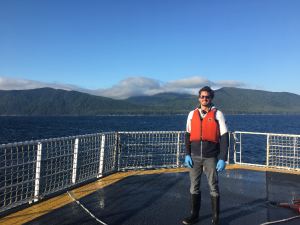Ph.D Candidate

| email: michaellivingston@uvic.ca lab phone: 250-472-5427 |
Research Interests
The operation of the oceans biological carbon pump is critical for sequestering large amounts of carbon dioxide from the atmosphere as organic matter in the deep ocean. The efficiency of the biological pump is largely determined by phytoplankton productivity (i.e., the uptake and incorporation of carbon dioxide by phytoplankton into organic matter) and the ability of organic matter to sink. Exopolymer gels, also referred to as transparent exopolymer particles, play an essential role in influencing the efficiency of the biological pump due to their global distribution, ability to enhance organic matter aggregation, and their neutral buoyancy. It is therefore important to understand how climate change and increased ocean temperatures will affect the overall concentrations of these particles.
My research focuses on the main drivers of TEP concentrations and relating TEP to the operational efficiency of the biological pump. I also work on utilizing statistical models to predict TEP concentrations based off commonly reported ocean measurements, such as chlorophyll a, nutrients, and dissolved oxygen. These models have been applied to long standing datasets in the Northeast Pacific from the years 1992 – 2021 and have been used to estimate changes in TEP concentrations over this period. By examining trends from the past, we can deduce valuable insights into the future.
Education
2018 – current, PhD Biology, University of Victoria
2017 – B.Sc. Honours with Distinction, University of Guelph Marine and Freshwater Biology
Peer-Reviewed Journal Papers
Livingston, M.D., Bhargav, V.V., Turko, A.J., Wilson, J.M., Wright, P.A. (2018). Widespread use of emersion and cutaneous ammonia excretion in Aplocheiloid killifishes. Proceedings of the Royal Society B: Biological Science, 285(1884), 1-7. https://doi.org/10.1098/rspb.2018.1496.
no ads
